- Home
- Celina Grace
The Asharton Manor Mysteries Boxed Set (Books 1 - 4) Page 2
The Asharton Manor Mysteries Boxed Set (Books 1 - 4) Read online
Page 2
Verity signed off her letter with “Joanie, you must write to me again soon, I love receiving your letters. Your descriptions of Asharton Manor are so vivid I feel like I’m there with you. Tell me more about living in the country and whether you’re learning any new dishes, and if the mistress is still having the vapours all over the place. And come to London when you can, I miss you.”
I smiled as I folded up the letter and put it in my bedside table. It might be slightly immodest of me to say, but I do have a good way with words. I find it easy to put them together in pleasing sentences. At least, I think they’re pleasing. Verity’s not the only person to have told me I write good letters. It was knowledge I hugged close to myself, when the days in the kitchen seemed so long, and the work so hard, and I didn’t seem to be getting any better at cookery. At least writing was something I could do well.
Verity’s last paragraph recurred to me the next morning. The mistress had come down to go through the menus with Mrs. Cotting and, having not seen her for a week or so, I was somewhat shocked at her appearance. I’d rather mockingly described her ‘illnesses’ to Verity as the bored fancies of an idle woman, but today she looked properly unwell; pale and thin and with her golden hair dulled somehow, as if the shine had worn off it. She talked to Mrs. Cotting in a listless tone, as if food were the last thing she was thinking about.
Perhaps she was in the family way, at long last, for all she’d lost weight. It can take some women like that, at first. She’d had some sickness, as we heard from Violet in great, and in my opinion unnecessary, detail when she came down to sit with us in the servants’ hall, that evening. I was trying to read a book but had to shut the covers in the end, as Violet went on and on about the mistress’s illness and how she moped around her room all day and had a row with the master.
“Fighting like cats and dogs, they were,” said Violet with relish. “She was crying and he stormed off. Wouldn’t surprise me if she’s up the spout and it’s not his, you know.”
“Violet!” I said, genuinely shocked. Mrs. Cotting was in her own sitting room, or you can be sure Violet would never have said such a thing. “How can you say that?”
Violet looked sly. “I see things, you know,” she said. “He’s not been in her bed in weeks. And she’s fainting and crying and sick all the time. Can’t be anything else, can it?”
I could feel myself blushing. “Well, you might be right, but it’s not for us to speculate, is it?” I said and opened my book again. Violet snorted – she had a most unattractive way of doing that – and she and little Meg went outside to smoke a cigarette and gossip some more.
Nothing more was said about the mistress and, in a week or so, she got well again and began to look better. She didn’t appear to get any stouter, so that theory of Violet’s was complete nonsense, in my opinion. I overheard her and Miss Cleo laughing about Mrs. Carter-Knox’s latest monstrous flower arrangement which stood in the hallway, looming like a piece of jungle stuck in a large vase.
“Darling, one expects to see a team of explorers emerging, with pith helmets,” Miss Cleo drawled, and Madam giggled. I felt a bit sorry for Mrs. Carter-Knox. She always struck me as the odd one out, a middle-aged lady in a house full of young people. Her husband had been the master’s uncle and he’d died fairly young, leaving her a childless widow at forty-eight. Apparently, she’d come for a visit last year and just stayed on, which was another source of friction between the Denfords, according to the gossipy Violet.
I’d been hoping to go to London on my next day off, and had been saving up for the ticket. But, as it happened, Verity and I weren’t able to coordinate our days off in order to be able to meet. I was disappointed, but tried to console myself with the thought that we’d manage it soon. There was so much I wanted to tell her that wasn’t always something I could put in a letter. Like the time I went for a walk in the woods around the manor.
That was a very queer thing. The more I’ve thought about it, the stranger it seems. It was my afternoon off and it was such a lovely day I thought I’d spend it exploring a bit more of the grounds. There were apparently some lovely walks in the woods that surrounded the estate and, although I was slightly nervous about getting lost, I decided to go for a bit of a tramp about. I packed up some sandwiches and a flask of tea and set off. I passed Mrs. Carter-Knox in the garden, cutting flowers for another of her arrangements, while Miss Cleo and the mistress drank cocktails in the conservatory. I sighed for a moment at the unfairness of life. What I wouldn’t give to be able to swan around, poking flowers into vases and then retiring back to my rooms, exhausted, for a nap, just as Mrs. Carter-Knox did every day. What I wouldn’t give to sit in a luxurious conservatory and swig cocktails, lifting the glass with my fingers covered in diamond rings, knowing I could sit there all day if I wanted to, because I didn’t have to cook, or wash up, or scrub down the kitchen table. Why hadn’t I been born into a highborn family? Why did I have to be poor and work for my living?
I stomped out of the gardens and followed the footpath to the woods, feeling cross at the unfairness of life. After a few moments, though, I began to cheer up. It was a sunny day, with the blue sky covered in scudding white clouds – warm for May. I had to be back by six and I wasn’t planning on being out longer than a couple of hours. I really didn’t want to have to find my way back through the woods in the dark.
I walked, at first keeping the manor in sight but, as I grew more confident, I struck out on the smaller paths that wound through the beech trees. They were majestic trees and walking down a line of them felt almost as though I were walking through somewhere like a cathedral. The old brown leaves rustled beneath my feet as I walked and the woods were alive with bird song. I was enjoying myself so much I barely noticed that I was straying farther and farther into the woods. The trees gradually began to change, from the smooth-skinned beeches, to the gnarled oaks and the darker evergreens. They grew ever more thickly about the path and my steps began to be more and more hesitant.
Eventually, I stopped. I was in some sort of vague clearing, in the midst of a thick forest of pines. The sun had gone behind a cloud and the noises of the forest somehow became muted and then stilled altogether. I stood uncertainly, looking about me. The clearing was about forty foot wide and in the middle stood a jumble of stone. I walked a little closer. As I got closer, I could see that the stone was actually broken masonry. Had a house once stood here? I looked about me, at the forest pressing in on all sides. Suddenly, I felt swamped by a wave of uneasiness. No, it was stronger than that. It was fear.
I turned, my hand up to my throat, heart thudding. The silence pressed down on me like a thick blanket and my ears buzzed. Then, above the noise of my heartbeat, I heard a distinct sound – a loud crack as a twig snapped underfoot. My fear leapt up another notch. Was there someone following me? Chasing me? I am ashamed to say I was almost panting, my heart racing. I saw a figure through the dark branches of the trees, moving towards me, and nearly screamed. Then, as he stepped out into the clearing, a surge of relief made my knees weaken. It was John Manfield, the mistress’s brother.
He walked up to me, his gun crooked over his arm, smiling and whistling. All of a sudden, my panic seemed incomprehensible. The smile I gave him in return was possibly far too eager, but I was just so relieved to see a familiar face.
“Good afternoon,” he said. “Out for a walk?”
Now that I had myself under control again, I was beginning to feel uncomfortable in a different way. I simply could not stand and chat to this man in a manner in which I could have chatted to a man of my own class. The knowledge of the gulf between us closed up my throat and I could only nod, dumbly.
“Certainly a lovely day for it,” said Mr. Manfield. He looked at me a little more closely. “Are you quite well, Joan?”
The terror of the past few minutes must still have shown in my face. Impulsively, I said, “I was afraid I was lost. I found this clearing and – well, it was strange…”
I tra
iled off. I didn’t even really know what I was trying to say. But Mr. Manfield was looking at me as if he understood.
“Gave you a bit of a turn, did it?” he asked, and I found myself nodding. “Yes, it’s a strange place. Used to be an old place of worship here, you know. A long time ago.”
“Really?” I was interested, despite myself.
Mr. Manfield nodded, staring about him at the encircling trees. “The vicar was telling me about it, last Sunday. They used to worship one of the heathen goddesses here. Astarte, she was called. Pretty strange stuff used to go on here, by all accounts.”
I could feel myself blushing. Heathen goddesses sounded like the sort of topic where some men would take the opportunity to make some rather broad jokes. As that occurred to me, it also occurred to me that I was alone in the middle of a wood with a man, a man who apparently had ‘an eye for the girls’. What if he—? I wondered what would be worse, to run or to stay…
I’ve worked in a few places where the masters were awful. One place was so bad for it that you were afraid to even go to the privy on your own, in case you were grabbed. I didn’t last long, there. But, I had to say, I didn’t get the sort of feeling from Mr. Manfield. He didn’t seem like he would be a threat in that way – I don’t know how I could have felt that, but I did. I relaxed a little but kept myself wary.
We both stood looking at the trees. They looked oddly as though they were watching us back and I couldn’t suppress a shiver.
Mr. Manfield glanced at me. “The villagers still won’t come here,” he said. “Not if they don’t have to. I suppose every village has its memories. Bad ones.”
I nodded, although I wasn’t exactly sure of what he was saying.
“Human sacrifice,” he said softly. I could feel my eyebrows shoot up and I began to feel nervous again. Mr. Manfield went on. “Astarte, the goddess – apparently they used to make sacrifices to her, here. Mostly animals but a few people, now and again. Horrible business, what?”
I nodded again, fervently.
“That’s where the manor gets its name,” he went on. “It’s a corruption of Astarte.”
“I wondered where it came from. It’s a queer name.”
“Yes, it is. The whole set-up is queer, isn’t it?”
He was talking to me again like an equal. It made me thrilled and uneasy, in equal measure.
“Reminds me of Africa, you know,” said Mr. Manfield, ruminatively. “I lived on the east coast, a place called Teganka. My local tribe had some odd superstitions. Thought they could ill-wish people. A bit rum, you know, because people did actually sicken and die, sometimes. Odd thing, superstition…”
The sun came out suddenly, dappling the clearing with golden light. I felt my heart actually lift and the odd feeling of dread and oppression suddenly lifted.
“Can you find your way back?” asked Mr Manfield. I wondered whether he’d experienced the same lightening of spirit as I had. He certainly looked a little happier.
“Oh, yes, sir. I’m quite sure I can get back. Thank you.”
“Well, I’d best be off then. If you’re sure…?”
“Quite sure, thank you sir. You’re very kind.”
“Righto.” He tipped his hat to me and strode off, hoisting his gun up onto his shoulder. I watched him walk away and then turned myself and began to retrace my steps, as quickly as I could without actually running. I’d had enough of the glories of nature. I wanted to be back amongst people. Even the thought of all the hard work awaiting me, later that evening, didn’t slow me down.
Things continued uneventfully for a week or so. The master went up to London, the mistress came down every day with her menus for Mrs. Cotting. I saw Mr. Manfield go off in the direction of the woods, with his gun over his shoulder, almost every morning that week. He seemed to prefer being outdoors, unlike the mistress who was rarely seen in the gardens. I wondered whether they were close. He seemed to enjoy the company of Mrs. Carter-Knox; they would often be found talking about wildlife and gardening and exotic plants. Apparently she’d spent some time in Africa too and they often spoke about their time there. Miss Cleo spent most of her time with the mistress, although I had once come across her and the master in the library, talking together in low voices. She and Mr. Manfield didn’t seem to have much to do with one another. In fact, I would have said that they were downright prickly with one another, but I had no idea why. I would have liked to have a brother, or any sibling, really. Verity was the closest thing to a sister I had, and she was a blessing to be remembered if ever I felt a little down and lonely about my place in the world.
Then the mistress got ill again. This time, the doctor was called and I saw him leaving the building and driving away in his black car, very neat and correct in his suit and hat. He’d been shown to the bedroom by Mrs. Smith and she came into the kitchen shortly after that with the tray of food that Mrs. Cotting had prepared for the mistress.
“She didn’t fancy it, then?” I said, looking at the array of untouched dishes on the tray.
“Oh, she’s worse this time,” said Mrs. Smith. “Can’t keep anything down. And she has strange – fancies, I think you’d call them. Delusions.” She hesitated for a moment. “I think Doctor’s quite worried.”
“Humph,” said Mrs. Cotting. “We’ll soon see her up and about again, mark my words.”
Funnily enough, Mrs. Cotting was right. Two days later, the mistress was up and about again, wafting about the house in her beautiful clothes. But she looked – I don’t know – strange. Almost as if she were listening to something no one else could hear. The master came back from town that night and the two of them dined alone. Mr. Manfield had gone to visit a friend and Miss Cleo was up in London for the night. Mrs. Carter-Knox had ordered a tray to be brought up to her room. She often did that, which annoyingly made for extra work. Luckily, the table menu tonight was quite simple, for a change; clear soup, a chicken and mushroom pie and then a savoury at the end instead of a sweet. Annie was ill in bed with a bad cold and so I had to wait at table, which I normally hated doing. I felt so big and clumsy in the parlour maid’s uniform and I was always afraid I would drop a dish or, worse, spill something hot on one of the guests.
The dining room was silent as I moved around the table, proffering the vegetables. There was no conversation between husband and wife, no sound except for the chime of cutlery on china and the crackle and spit of the fire. Perhaps it was always like this, I had no way of knowing. As I waited for the mistress to serve herself a miniscule portion of chicken pie, I realised that I’d forgotten to bring up the gravy. Quickly I looked up to see if the butler, Mr. Pettigrew, had noticed, but he was busying himself at the drinks cabinet. As soon as I decently could, I quietly left the room and pounded down the back stairs to the kitchen.
Thankfully the gravy was still hot – Meg, bless her heart, had put it in the top of the Rayburn to keep warm. I gave her a grateful smile as I dashed back across the kitchen floor, holding the jug in front of me like a trophy. Back up the stairs, nineteen to the dozen, and my hand was on the door to the dining room when I heard the mistress’s hissing voice, which cut through my own jagged breathing. She was saying something to the master in a tone so loaded with venom it stopped me in my tracks.
“You do it to torment me, I think you get pleasure out of it—“
“Oh, Delphine…” The master’s voice was bored and a little annoyed. I stayed rigid for a moment, behind the door.
The mistress spoke again, her voice ragged. “Why you and John have to be at each other’s throats all the time, I don’t know. You’re always fighting and it makes it so hard for me. You have no idea what my life is like, none at all.”
“That’s not the case—“
She cut across him. “If you’re not having cosy little chats with Cleo, or boring on with your aunt, you’re ignoring me. I could be invisible, for all you care.”
“Delphine, now that’s wrong—“
She cut across him again. “I h
ate you,” she said and the sentence ended on a sob.
I was holding my breath (which was not easy after running down and up a flight of stairs), but nearly screamed when there was a ponderous clearing of a throat behind me. I turned to see Mr. Pettigrew, with a newly opened bottle of port in his hand.
“What seems to be the problem, Joan?” he asked, frowning.
“Nothing - nothing at all,” I stuttered and pushed open the dining room door with my free hand.
Madam had her golden head down, her fingers clenched around the silver cutlery. I thought I saw a tear fall onto her plate. Mr. Denford was busy cutting up his pie but his jaw was clenched – in fact, his whole body was clenched, tight, like an angry fist. I put the gravy on the table, prickling all over with embarrassment. Had they realised I’d been listening at the door? Before I could think anything else, the mistress dropped the knife and fork with a musical tinkle, pushed back her chair and fled the room. I could see Mr. Pettigrew regarding her with astonished eyes before his training took over and the mask of the impersonal servant settled back over his features.
If I had been Violet, I would have regaled the other servants with this little piece of drama. I didn’t, though. It felt wrong, to have eavesdropped and to be witness to such emotional distress. What had the mistress meant? Did the master and her brother not get along? I thought of the way she’d said cosy little chats with Cleo, in a voice loaded with sarcastic meaning. As I got undressed that night and put my weary bones to bed, I thought of the hissed venom in her voice, clear enough even through a wooden door.

 Scimitar (A Kate Redman Mystery
Scimitar (A Kate Redman Mystery Fury: (A Kate Redman Mystery: Book 11) (The Kate Redman Mysteries)
Fury: (A Kate Redman Mystery: Book 11) (The Kate Redman Mysteries) Valentine
Valentine![[Kate Redman 08.5] Joy Read online](http://i1.bookreadfree.com/06/kate_redman_08_5_joy_preview.jpg) [Kate Redman 08.5] Joy
[Kate Redman 08.5] Joy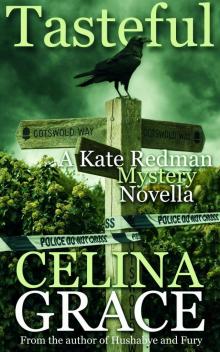 Tasteful (A Kate Redman Mystery Novella)
Tasteful (A Kate Redman Mystery Novella)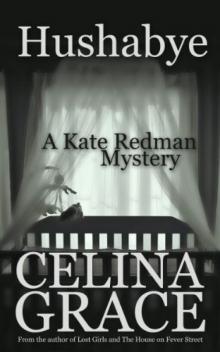 Hushabye
Hushabye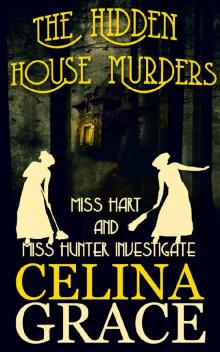 The Hidden House Murders: Miss Hart and Miss Hunter Investigate: Book 3
The Hidden House Murders: Miss Hart and Miss Hunter Investigate: Book 3 A Blessing From The Obeah Man
A Blessing From The Obeah Man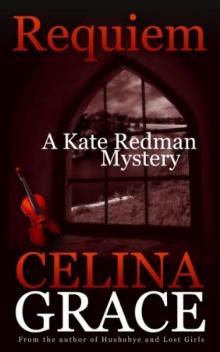 Requiem
Requiem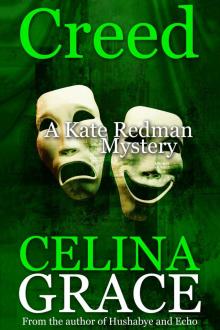 Creed (A Kate Redman Mystery
Creed (A Kate Redman Mystery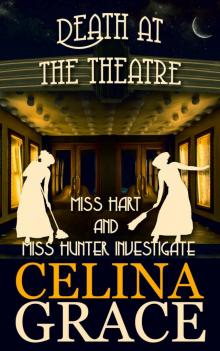 Death at the Theatre: Miss Hart and Miss Hunter Investigate: Book 2
Death at the Theatre: Miss Hart and Miss Hunter Investigate: Book 2 Siren (A Kate Redman Mystery
Siren (A Kate Redman Mystery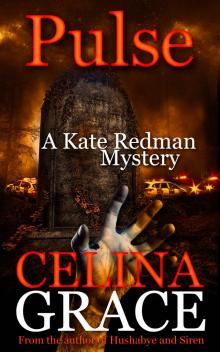 Pulse (A Kate Redman Mystery
Pulse (A Kate Redman Mystery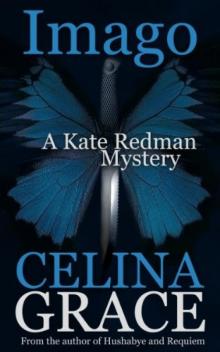 Imago
Imago The Asharton Manor Mysteries Boxed Set (Books 1 - 4)
The Asharton Manor Mysteries Boxed Set (Books 1 - 4)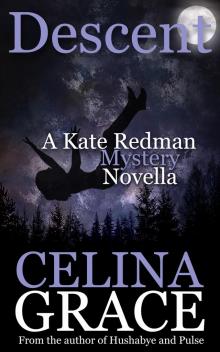 Descent (A Kate Redman Mystery Novella)
Descent (A Kate Redman Mystery Novella) Snarl
Snarl